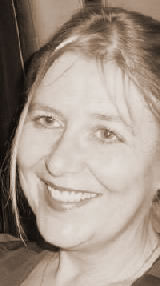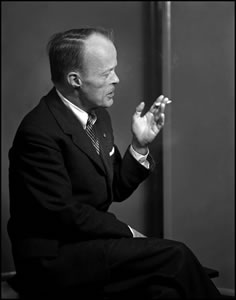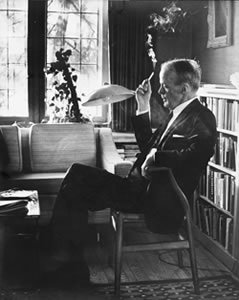De Amerikaanse dichteres Sharon Olds werd geboren op 19 november 1942 in San Francisco. Zie ook alle tags voor Sharon Olds op dit blog.
1954
Then dirt scared me, because of the dirt
he had put on her face. And her training bra
scared me—the newspapers, morning and evening,
kept saying it, training bra,
as if the cups of it had been calling
the breasts up—he buried her in it,
perhaps he had never bothered to take it
off. They found her underpants
in a garbage can. And I feared the word
eczema, like my acne and like
the X in the paper which marked her body,
as if he had killed her for not being flawless.
I feared his name, Burton Abbott,
the first name that was a last name,
as if he were not someone specific.
It was nothing one could learn from his face.
His face was dull and ordinary,
it took away what I’d thought I could count on
about evil. He looked thin and lonely,
it was horrifying, he looked almost humble.
I felt awe that dirt was so impersonal,
and pity for the training bra,
pity and terror of eczema.
And I could not sit on my mother’s electric
blanket anymore, I began to have a
fear of electricity—
the good people, the parents, were going to
fry him to death. This was what
his parents had been telling us:
Burton Abbott, Burton Abbott,
death to the person, death to the home planet.
The worst thing was to think of her,
of what it had been to be her, alive,
to be walked, alive, into that cabin,
to look into those eyes, and see the human
Sharon Olds (San Francisco, 19 november 1942)
De Duitse schrijfster Anna Seghers werd op 19 november 1900 geboren in Mainz als Anna Reiling. Zie ook alle tags voor Anna Seghers op dit blog.
Uit: Transit
“Sie können sich gar nicht vorstellen, was dieser Mensch mir für Unannehmlichkeiten bereitet hat! Er kam am 15. gegen Abend, als die Deutschen schon einzogen. Ich hatte mein Hotel nicht geschlossen, ich war geblieben. Im Krieg, hat mein Vater gesagt, geht man nicht weg, sonst wird einem alles versaut und gestohlen. Was soll ich mich auch vor den Deutschen fürchten? Die sind mir lieber als die Roten. Die tippen mir nicht an mein Konto. Herr Weidel kommt also an und zittert. Ich finde es komisch, wenn einer vor seinen eigenen Landsleuten zittert. Ich war aber froh für einen Mieter. Ich war ja damals allein im ganzen Quartier. Doch wie ich ihm meinen Anmeldezettel bringe, da bat er mich, ihn nicht anzumelden. Herr Langeron, wie Sie ja wissen, der Herr Polizeipräsident besteht streng weiter auf Anmeldung aller Fremden; es muß ja auch Ordnung bleiben, nicht wahr?”
“Ich weiß nicht genau”, erwiderte ich, “die Nazisoldaten sind ja auch alle Fremde, Unangemeldete.” “Nun, dieser Herr Weidel jedenfalls machte Chichi mit seiner Anmeldung. Er habe sein Zimmer in Auteuil nicht aufgegeben, er sei ja auch dort noch angemeldet. Mir gefiel das gar nicht. Herr Weidel hat schon mal früher bei mir gewohnt mit seiner Frau. Eine schöne Frau, nur hat sie zu wenig auf sich gehalten und öfters geweint. Ich versichere Ihnen, der Mensch hat überall Unannehmlichkeiten gemacht. Ich ließ ihn also in Gottes Namen unangemeldet. Nur diese eine Nacht, sagte ich. Er zahlte im voraus. Am nächsten Morgen kommt mir der Mann nicht herunter. Ich will es kurz machen. Ich öffne mit meinem Nachschlüssel. Ich öffne auch den Riegel. Ich habe mir mal so ein Ding anfertigen lassen, womit man Riegel zurückschiebt.” – Sie öffnete eine Schublade, zeigte mir das Ding, einen schlau ausgeknobelten Haken. – “Der Mensch liegt angekleidet auf seinem Bett, ein Glasröhrchen leer auf dem Nachttisch. Wenn das Röhrchen vorher voll war, dann hat er eine Portion im Bauch gehabt, mit der man alle Katzen unseres Quartiers hätte umbringen können.
Nun habe ich ja zum Glück einen guten Bekannten bei der Polizei, Saint Sulpice. Der hat mir die Sache ins Reine gebracht. Wir haben ihn vordatiert angemeldet, den Herrn WeideI. Dann haben wir ihn sterben lassen. Dann wurde er beerdigt. Dieser Mensch hat mir wirklich mehr Verdruß gemacht als der Einmarsch der Deutschen.”
“Immerhin, er ist tot”, sagte ich. Ich stand auf. Die Geschichte langweilte mich. Ich hatte zuviel vertrackte Sterbefälle mitangesehen. Da sagte die Frau: “Sie müssen nicht glauben, daß darum die Unannehmlichkeiten für mich zu
Ende sind. Dieser Mensch bringt es wirklich fertig, einem bis über das Grab hinaus Unannehmlichkeiten zu bereiten.” Ich setzte mich noch einmal. “Er hat einen Handkoffer hinterlassen. Was soll ich nur mit dem Handkoffer tun? Er stand hier im Büro, als die Sache passierte. Ich vergaß ihn.
Jetzt will ich doch nicht bei der Polizei noch einmal alles aufwärmen.” “Na, schmeißen Sie ihn doch in die Seine”, sagte ich, “oder verbrennen Sie ihn in Ihrer Zentralheizung.” “Das ist unmöglich”, sagte die Frau, “ich würde das nie riskieren.”
“Na, hören Sie mal, Sie haben sich schließlich die Leiche vom Hals geschafft, da werden Sie doch mit dem Handkoffer fertig werden.” “Das ist etwas ganz anderes. Der Mann ist jetzt tot. Das steht amtlich fest. Der Handkoffer aber, das weiß ich, ist ein juristischer Gegenstand, das ist ein Sachwert, das kann geerbt werden, es können Anwärter kommen.”
Ich war der Sache schon überdrüssig, ich sagte: “Ich nehme das Ding gern an mich, das macht mir nichts aus. Ich kenne jemand, der mit dem Toten befreundet war, der kann den Handkoffer zu der Frau bringen.” Die Wirtin war überaus erleichtert. Sie bat mich nur, ihr einem Empfangsschein auszustellen. Ich schrieb einen falschen Namen auf einen Zettel, den sie datierte und quittierte. Sie drückte mir herzlich die Hand, ich aber zog eilig mit dem Handkoffer ab. Denn mein Gefallen an dieser Patronin war ganz vergangen, so hübsch sie mir auch zuerst erschienen war. Ich sah auf einmal in ihrem schlauen langen Kopf nur den Schädel, auf den man schwarze Löckchen gesetzt hatte.“

Anna Seghers (19 november 1900 – 1 juni 1983)
De Amerikaanse dichter Alan Tate werd geboren op 19 november 1899 in de buurt van Winchester, Kentucky. Zie ook alle tags voor Alan Tate op dit blog.
Ode to the Confederate Dead
Row after row with strict impunity
The headstones yield their names to the element,
The wind whirrs without recollection;
In the riven troughs the splayed leaves
Pile up, of nature the casual sacrament
To the seasonal eternity of death;
Then driven by the fierce scrutiny
Of heaven to their election in the vast breath,
They sough the rumour of mortality.
Autumn is desolation in the plot
Of a thousand acres where these memories grow
From the inexhaustible bodies that are not
Dead, but feed the grass row after rich row.
Think of the autumns that have come and gone!–
Ambitious November with the humors of the year,
With a particular zeal for every slab,
Staining the uncomfortable angels that rot
On the slabs, a wing chipped here, an arm there:
The brute curiosity of an angel’s stare
Turns you, like them, to stone,
Transforms the heaving air
Till plunged to a heavier world below
You shift your sea-space blindly
Heaving, turning like the blind crab.
Dazed by the wind, only the wind
The leaves flying, plunge
You know who have waited by the wall
The twilight certainty of an animal,
Those midnight restitutions of the blood
You know–the immitigable pines, the smoky frieze
Of the sky, the sudden call: you know the rage,
The cold pool left by the mounting flood,
Of muted Zeno and Parmenides.
You who have waited for the angry resolution
Of those desires that should be yours tomorrow,
You know the unimportant shrift of death
And praise the vision
And praise the arrogant circumstance
Of those who fall
Rank upon rank, hurried beyond decision–
Here by the sagging gate, stopped by the wall.
Seeing, seeing only the leaves
Flying, plunge and expire
Turn your eyes to the immoderate past,
Turn to the inscrutable infantry rising
Demons out of the earth they will not last.
Stonewall, Stonewall, and the sunken fields of hemp,
Shiloh, Antietam, Malvern Hill, Bull Run.
Lost in that orient of the thick and fast
You will curse the setting sun.
Cursing only the leaves crying
Like an old man in a storm
You hear the shout, the crazy hemlocks point
With troubled fingers to the silence which
Smothers you, a mummy, in time.
The hound bitch
Toothless and dying, in a musty cellar
Hears the wind only.
Now that the salt of their blood
Stiffens the saltier oblivion of the sea,
Seals the malignant purity of the flood,
What shall we who count our days and bow
Our heads with a commemorial woe
In the ribboned coats of grim felicity,
What shall we say of the bones, unclean,
Whose verdurous anonymity will grow?
The ragged arms, the ragged heads and eyes
Lost in these acres of the insane green?
The gray lean spiders come, they come and go;
In a tangle of willows without light
The singular screech-owl’s tight
Invisible lyric seeds the mind
With the furious murmur of their chivalry.
We shall say only the leaves
Flying, plunge and expire
We shall say only the leaves whispering
In the improbable mist of nightfall
That flies on multiple wing:
Night is the beginning and the end
And in between the ends of distraction
Waits mute speculation, the patient curse
That stones the eyes, or like the jaguar leaps
For his own image in a jungle pool, his victim.
What shall we say who have knowledge
Carried to the heart?Shall we take the act
To the grave?Shall we, more hopeful, set up the grave
In the house?The ravenous grave?
Leave now
The shut gate and the decomposing wall:
The gentle serpent, green in the mulberry bush,
Riots with his tongue through the hush–
Sentinel of the grave who counts us all!
Allen Tate (19 november 1899 – 9 februari 1979)
Nagekomen bericht
De Oostenrijkse dichter, schrijver en vertaler Christoph Wilhelm Aigner werd geboren op 18 november 1954 in Wels. Hij leefde gedurende zijn kinderjaren kang in Grödig. Hij bezocht het gymnasium en studeerde daarna in Salzburg germanistiek, communicatiewetenschappen en sportwetenschappen. Hij werkte eerst als journalist, bij de ORF en werd redacteur bij het Salzburger Tagblatt. Zijn studie betaalde hij door te voetballen. Sinds 1985 is hij zelfstandig schrijver en
uitgever van de Salzburger AV Edition. Hij woont afwisselend in Toscana, Rome en Salzburg.
Nach langer Abwesenheit
Als ich ankam unter Fauchen
und Kratzen der Sonne waren die beiden
Katzen dünn wie Dachziegel
Ein winziger Sprühregen mühte sich durch
die Hitze wir hatten für Minuten
schimmernde Läuse im Pelz
Uns knurrten die Mägen. Bis zum Morgen
saßen wir im Gras im Garten
starrten einander an
Die Sehnsucht
Ein Bussard unter meinen Rippen
der hinpfeift auf der blanken Fläche
zwischen glasierten Wolken überm
gefrorenen Feld. Aufgebrochen
als hätten Gestalten Trüffeln gesucht
Steig kreuz und quer im Wind
Der Regen bürstet das Land
Könntest du aus der Erde springen
wie Musik und hauchst mir ins Ohr
Nach dem Winter
Nichts hat sich ereignet
Hab Holz gehackt und das Holz
redete von Glut
zweiundzwanzig Briefe geschrieben zwei erhalten
dem Regen zugesehn
wie er vom Wind auf Händen
getragen wurde und doch fiel
Ein anderer bin ich jetzt
Christoph Wilhelm Aigner (Wels, 18 november 1954)
Onafhankelijk van geboortedata
De Duitse schrijfster Veronika Aydin werd in 1961 in Emmerich geboren. Na Antalya en Manillawoont zij nu in Wiesnaden. Sinds 2003 publiceert korte verhalen en korte detectives zij in tijdschriften en bloemlezingen. In 2005 ontving zij de Kulturpreis für den Kreis Kleve.
Uit: Trapi trapu
“Tropen, Garten, Mondenschein.
Eine Party.
„Abschied nehmen ist nie leicht“, wirft Marie ganz leicht in die Runde.
Der Saxophonspieler unterstreicht ihren Satz mit einem langgezogenen Jammerton.
Die Leute nicken, nehmen erneut vom Salat und sind in Gedanken bei ihren Gedanken.
„Was leicht ist, ist nichts wert“, wirft sie hinterher, mitten in die Buttersoße – aber so leise, dass der kleine Platsch untergeht im Schmelz der Musik.
Egal, denkt Marie.
Sie schiebt ihre nackten Füße durch das Gras, streift dabei ihre Schuhe, die unter dem Tisch stehen, und genießt das Pieksen der frisch gekürzten Grashalme.
„Nicht jede Wiese ist weich“, sagt sie.
„Wie bitte?“, fragt die Frau rechts neben ihr. Sie lächelt, ein bisschen Mayonnaise klebt im Mundwinkel und Marie mag sie eigentlich gut leiden. Beverly heißt sie und so sieht sie auch aus. Aber jetzt lehnt Marie sich zurück und wirft einen Blick auf Beverlys Füße. Gepflegte Zehen in einer reizenden Sandalette schicken lackierte Grüße zur Tischkante hoch.
“Schon gut“, sagt Marie und lächelt.
Sie greift zu ihrem Besteck und spießt den rohen Fisch auf. Rosafarben ist er mit leicht grauen Rändern. Marie tunkt ihn in das kleine Töpfchen mit der Soße und dem Meerettich. Braune Soße und grüner Meerettich. Sie schließt die Augen und schiebt den Fisch in den Mund. Kaut. Schluckt. Wartet auf die Sensation, sich etwas Unverdorbenes einzuverleiben.
Wartet.
Sie öffnet die Augen und sieht den Soßenfleck auf ihrem roten Kleid. Wieder mal gekleckert. Auf das Kleid für den Mann, der auch heute nicht gekommen ist. Macht nichts, denkt Marie. Irgendwann, irgendwo wird er auftauchen. Sie wird ihn schon erkennen, wenn er auf den Tisch springt mit seinem verwegen geöffneten Hemd und den Nur-Du-Augen. Ihm sind Flecken egal. Na ja, denkt Marie, hoffentlich landet er nicht in der Buttersoße.
“Trapi trapu“, sagt der Mann gegenüber und sein Nachbar nickt und lacht. Manchmal hat Marie es mit den Ohren.
„Zickelismus, Pickelismus“, zwitschert seine Gefährtin auf der anderen Seite.

Veronika Aydin (Emmerich, 1961)











